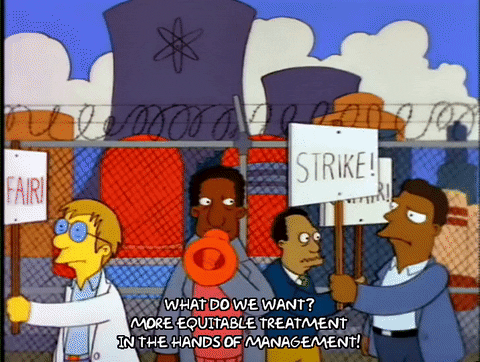
Morning! Today is 29th August which means there are officially only 2 days left before you can play Taylor Swift's "August" in the background of your adorable café hangout videos with your friends 🍂🍁
In this week’s edition:
❌ Lights, camera, strike
💡 Lights off
🌙 The sky is not the limit
🆔 E-passports are in
- The Itla Squad 💼
Business
Global 🌎
Sorry, Jessie J 🎵 it’s all about the money, money, money 🎵

Image by: Giphy
Workers all over the US are pissed off and they are making it known.
Lights, Camera, Strike: Workers from various companies including UPS, Amazon, Starbucks, and even the glitzy world of Hollywood entertainment are taking a stand. They've either gone on strike recently or threatened to do so. In 2023, there have already been over 200 strikes across the U.S., with more than 320,000 workers involved.
Why the anger? Money 💲💲💲. Fueled by concerns over job stability, tough times from the COVID-19 pandemic, big corporate earnings, rising prices, strong support for labor unions, and the widening gap between worker and executive pay, employees from various sectors are now boldly demanding better pay and working conditions.
So what now? Apart from you saying goodbye to your hopes to see your favorite shows anytime soon on the screen, the future is uncertain. Negotiations are aiming higher, as unions work to not just safeguard their wins, but also to navigate new tech and environmental shifts.
TLDR: Workers nationwide are taking action through strikes and threats, hitting companies like UPS, Amazon, Starbucks, and Hollywood. Over 200 strikes this year, involving 320,000+ workers, reflect frustrations over pandemic impacts, corporate earnings, rising costs, and pay gaps.
What else is new in news
✶ According to Axios' analysis of IPEDS (Integrated Postsecondary Education Data System), more students in private four-year universities receive financial aid (85.3%) compared to public schools (69.4%), even though public schools have more low-income students.
Local 🇵🇰
Dad’s “Just turn off the lights!” message finally sinks in..

Image by: Pexels
Blink, and your electricity bill has probably doubled in the last year.
Why is that so? Pakistan heavily relies on imported fuel sources such as furnace oil, coal, and liquefied natural gas (LNG) to generate about one-third of its electricity. However, the devaluation of the Pakistani rupee and geopolitical factors have driven up the prices of these imported fuels, resulting in historically high electricity bills across the nation.
But why does my bill keep going up and up? FCAs are partly to blame. Fuel charge adjustments (FCAs) are a mechanism set by the National Electric Power Regulatory Authority (NEPRA), which allows variations in fuel costs to be directly passed on to consumers in their monthly bills after NEPRA's review and approval.
Here's how FCAs work:
FCAs are a way to adjust the price of electricity production based on the cost of fuel used for power generation in a specific month.
NEPRA oversees this process and ensures that any changes in fuel costs are accurately reflected in consumer bills.
The adjustment is based on the total units of electricity generated and is requested after the completion of each month.
As a result, your dad randomly starts coming into your room and turns off extra fans and lights 🤷♀️
What's the fix? Instead of relying too much on foreign fuel, experts suggest that we use our own energy sources..
TLDR: Pakistan's reliance on imported fuels and currency devaluation has caused electricity bills to skyrocket. A key factor is Fuel Charge Adjustments (FCAs), allowing fuel cost variations to directly affect monthly bills under NEPRA's oversight. FCAs adapt power costs to fuel prices each month, leading to surprising bills.
News Flash
✶ The Asian Development Bank's latest report reveals that the combination of surging inflation and the persistent effects of the COVID-19 pandemic is pushing individuals in Asia and the Pacific further into extreme poverty.
Tech
Global 🌎
The sky is NOT the limit

Image by: Unsplash
The moon-landing club has a new member and it’s none other than our neighbor - India. But this time, the mission is taking it up a notch by aiming for the moon's south pole.
What is so special about the moon’s south pole? Pulling off a soft landing where your spaceship gently touches down without turning into cosmic confetti is no easy feat but doing it on the South Pole makes it even cooler. Unlike the flatter sites near the equator where past missions succeeded, the South Pole has a rough, uneven landscape, which explains why previous landing attempts at the South Pole by India and Russia didn't end as planned.
If it's so dangerous, why even land there? Water, which is equal to hitting a gold mine on Earth, has been found on the South Pole. The presence of ancient water ice (ice because it’s freezing there) not only hints at the Moon's history but also opens doors to cool possibilities. The ice could offer insights into lunar volcanoes, the origins of oceans, and clues about the early Solar System. If it is in significant quantities, it could serve as drinking water for explorers and a coolant for equipment.
What’s next in the space exploration world for India? High from the success of this mission, India's space agency is embarking on a new voyage—this time to study the sun. Scheduled for the first week of September, the Aditya-L1 mission will explore solar winds, shedding light on their impact on Earth and potentially on our climate.
TLDR: India has joined the moon-landing club and landed on moon's south pole, a challenging task due to its rough terrain. Despite past failures, this region holds promise due to the discovery of water ice, which could offer insights into lunar history and practical applications like drinking water and equipment coolant. India's space agency is also gearing up for the Aditya-L1 mission, focused on studying the sun and its effects on Earth's climate.
What else is new in news
✶Major tech giants like Amazon, Apple, Google, Meta, Microsoft, Snapchat, and TikTok are required to adhere to a new European law that covers a range of aspects, from social media moderation to targeted ads and counterfeit goods in e-commerce.
Local 🇵🇰
E-passports are here

Image by: Pexels
Pakistan is stepping into the digital age with e-passports, leaving traditional passports behind. These new passports have an embedded electronic chip, storing important info, and making travel faster and safer.
Perks of E-Passports:
Quick Immigration: E-passports speed up airport checks, saving time.
Better Security: The chip's advanced info stops identity theft and illegal entry.
Easy E-Gates: E-passport holders can glide through e-gates at airports.
Online Applications: Applying is simple with online forms, and less paperwork.
Global Benefits: Overseas Pakistanis get extra security and smoother travel.
Getting yours: The application process for both traditional Machine Readable Passports (MRPs) and e-passports remains the same. However, if you are out of Islamabad, you might wanna wait as the e-passports are initially available in Islamabad, and will expand to other cities..
TLDR: Pakistan is embracing e-passports, leaving traditional ones behind. These new passports have a chip for faster, safer travel. They offer quick immigration, top-notch security, easy e-gates, online applications, and global benefits for overseas Pakistanis. Applying is similar, but e-passports start in Islamabad and will later be available in other cities.
Tech tour of news
✶Paismo, an HR tech startup from Pakistan, has just raised $1.3 million in a seed funding round. The startup's software-as-a-service (SaaS) product, offered through subscriptions, is at the core of its operations.
More interesting Itla (اطلاع) we consumed:
🎥 This video by Dr. K explains how dreams are like mental escapes that help us cope with negativity, but we don’t dream enough which might possibly be contributing to our morning grumpiness. It is one of the most informative videos we watched on all things sleep.
📰 Remember when Bill Gates compared AI with the atomic bomb? Maybe he wasn’t so far off. This article breaks down how the US Air Force is asking for $5.8 billion in its budget to create AI-powered collaborative combat planes which are said to be ‘ideal’ for completing suicide missions.
▹Was this newsletter forwarded to you & want more of it? You can subscribe here.
▹Indirectly tell your friends how cool and smart you are by forwarding this email to them.
▹How are we doing? Ask any question or share feedback by replying to this email.

